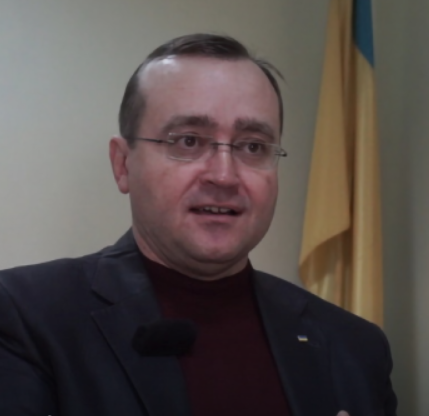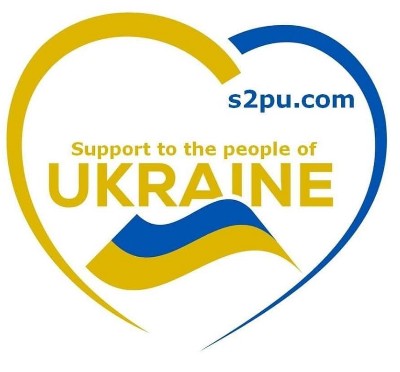
Recognition of the Holodomor as genocide is an obligation to the victims of violent crime and prevention of the repetition of the tragedy
- speech from Andrii Ivanets, researcher of the National Museum of the Holodomor, Kyiv

Dear organizers and participants of the conference "Solidarity and partnership with Ukraine"!
I am sincerely glad to take part in the conference "Solidarity and partnership with Ukraine" in Oslo! Taking this opportunity, I would like to thank Norway for supporting the Ukrainian nation in the difficult struggle for survival and freedom, for restoring the territorial integrity of the Ukrainian state and the international legal order.
The aggressive war against Ukraine, which Russia has been waging since 2014, is a fundamental challenge to the international legal order. For the first time since the Second World War, an aggressor state in Europe, where both world conflicts began, is trying to annex the territory of another sovereign state, contrary to its bilateral and multilateral obligations. Moreover, Russia attacked the state, which it guaranteed the preservation of territorial integrity, respect for sovereignty and non-interference in internal affairs, in particular, after Ukraine gave up the world's third nuclear arsenal. Moreover, during the aggression, the Russian Federation also resorted to nuclear blackmail against Ukraine and other civilized countries.
Russia's war against Ukraine is not only aggressive in nature, but also genocidal. Genocide is, according to international law, acts with the intent to destroy, in whole or in part, a national, ethnic, religious or racial group as such. Russia seeks to destroy the Ukrainian state and nation, commits other grave international crimes.
Its actions acquired an extremely dangerous character during the large-scale phase of aggression that began on February 24, 2022, when the aggressor state made an unsuccessful attempt to liquidate the Ukrainian state by military means in a short period of time and implement a genocidal policy against the Ukrainian nation. The Russian authorities promote the ideology of the "Russian world", which de facto denies the right of the Ukrainian nation to sovereign development, its own state, language and culture. The president of the Russian Federation, representatives of the Russian government and politicians have repeatedly stated that Ukrainians as a people "do not exist", about the "artificial creation" of the Ukrainian nation. In particular, the Ministry of Defense of the Russian Federation in July 2021 obliged the military to study, as part of military-political training, V. Putin's manipulative article "On the historical unity of Russians and Ukrainians", in which he promoted the ideology "Russians and Ukrainians are one people", wrote about the creation of Ukraine allegedly at the expense of the "historical territories" of Russia. Public calls to exterminate Ukrainians are often heard in the Russian Federation.
The Russian occupiers on the captured lands of Ukraine persecute and kill citizens with pro-Ukrainian views, exterminate the intelligentsia, commit mass crimes against the civilian population (torture, rape, murder, kidnapping, deprivation of liberty, etc.), instead of the illegally liquidated Ukrainian education system, they introduce one that aims to change the identity of children and youth, destroy monuments of history and culture, especially those related to Ukrainian identity, loot and destroy Ukrainian museums, archives, theaters, libraries and churches.
The Russian Federation is mass-deporting Ukrainian children from the occupied territories to its territory with the aim of changing their identity, in particular, due to illegal adoption by Russians, for which the International Criminal Court has already issued arrest warrants for the President of the Russian Federation and the Russian President's Commissioner for Children's Rights Maria Lvova-Belova. Russia is also purposefully destroying infrastructure and life support facilities in Ukraine, practically erasing several Ukrainian cities (Mariupol, Volnovakha, Shchastya, Severodonetsk, Bakhmut, etc.) and other settlements from the face of the planet. Also in 2022–2023, the aggressor state repeatedly endangered the safety of the functioning of Ukraine's nuclear facilities, in particular, the Zaporizhia NPP, the largest in Europe.
In 2022–2023, Russia de facto lost the information war surrounding the aggression against Ukraine at the strategic level. The absolute majority of the countries of the world and international organizations did not believe in the officially declared goals of the so-called "special military operation" - the "denazification" and "demilitarization" of Ukraine, as evidenced, in particular, by the UN vote on the issue of the Russian-Ukrainian armed conflict. A number of countries and international organizations recognized the Russian regime as terrorist or Russia as a terrorist state. And the representative authorities of Poland, Lithuania, Estonia, Latvia, Canada, the Czech Republic, and Ireland recognized Russia's actions in Ukraine as genocide in the spring and summer of 2022.
The interests of Ukraine and the civilized part of the international community coincide in the main thing - our task is to stop the genocide and aggression on the part of Russia and restore the operation of international law. Russia's success in this criminal war could be a disaster for the world. It not only strengthens the positions of anti-democratic states, but is capable of provoking other global negative processes, because in the world there are 140 potential territorial conflicts between states, including nuclear ones. In support of Ukraine, a coalition of 55 civilized countries was formed in Ramstein. I must state with gratitude that Norway takes a leading position in supporting our country. In 2014, your country condemned the seizure of Crimea by the aggressor state. With the beginning of Russia's large-scale aggression in 2022, Norway provides military, financial and humanitarian aid to the Ukrainian nation, accepts Ukrainian refugees. Norway has approved an unprecedented five-year aid program for Ukraine worth almost NOK 75 billion ($7.3 billion).
Consolidating Norway's leadership position in repelling aggression and restoring the international legal order in the eyes of Ukrainians, more than 90% of whom regard the Holodomor as genocide, can be another moral and political step.
An important reason that led to an unprecedented tragedy in Europe after the Second World War and large-scale international crimes was the lack of an adequate assessment of the criminal regime of the USSR and communist ideology, both in Russia itself and in the world in general. In particular, one of the biggest crimes of the communist regime – the Holodomor of 1932–1933 – was not properly appreciated. This, in turn, led to the first symbolic, and from now on, political restoration of the totalitarian regime in Russia.
Many Ukrainians remember the positive partnership with the Norwegians. I will not mention here the times of Harald III and Yaroslav the Wise due to time constraints. And in the 20th century, when Ukrainians in 1921–1923 experienced an unprecedented famine at that time, caused by the policy of the Russian communist regime, drought and the consequences of seven years of wars and revolutions, a humanist, traveler, scientist and social and political figure Fritjof Nansen. He not only organized the activities of the international mission in Ukraine to help the starving, but also gave a significant part of the Nobel Peace Prize to the organization of the exemplary Mykhailo agricultural research station in the Dnipro region.
At that time, the Ukrainian People's Republic, the recognition of which, by the way, was supported by F. Nansen in 1920, was already captured by Soviet Russia. The Russian communist regime implemented a communist project in Ukraine and used its resources for its strengthening and expansion. After the creation of the USSR and a short period of relative internal liberalization in the economy and the development of Ukrainianization in the USSR in the late 1920s, the communist authorities took a course to establish totalitarianism.
Already in 1929–1930, the authorities in Moscow began forced industrialization, collectivization, and disenfranchisement of the peasantry in the predominantly peasant state. At the same time, the communist regime in Ukraine begins mass repressions against the intelligentsia and the Ukrainian Autocephalous Orthodox Church.
In Ukraine, in 1930, the largest spontaneous opposition to the policies of the CPSU(b) and the USSR government was recorded. Today, from the declassified archives of the special services, we know that over 4,000 mass protest demonstrations took place in the USSR that year with the participation of about 1.2 million people. More than 40,000 peasant households emerged from collective farms, and about 500 village councils refused to accept unrealistic plans for grain procurement. Peasant uprisings, which were suppressed by the troops, covered entire districts.
Such actions of Russia grossly violate the Convention on the Prevention of the Crime of Genocide and its Punishment (hereinafter referred to as the Genocide Convention), adopted by the UN General Assembly on December 9, 1948.
They are subject to, in particular, clauses of Article 2 of the Convention:
a) killing members of this group;
b) causing serious bodily harm or mental disorder to members of such a group;
c) deliberate creation of living conditions for members of a group, which are designed for the complete or partial destruction of the group;
f) forcible transfer of children of this group to another group. The object of the crime of genocide is the Ukrainian national group.

Comments powered by CComment